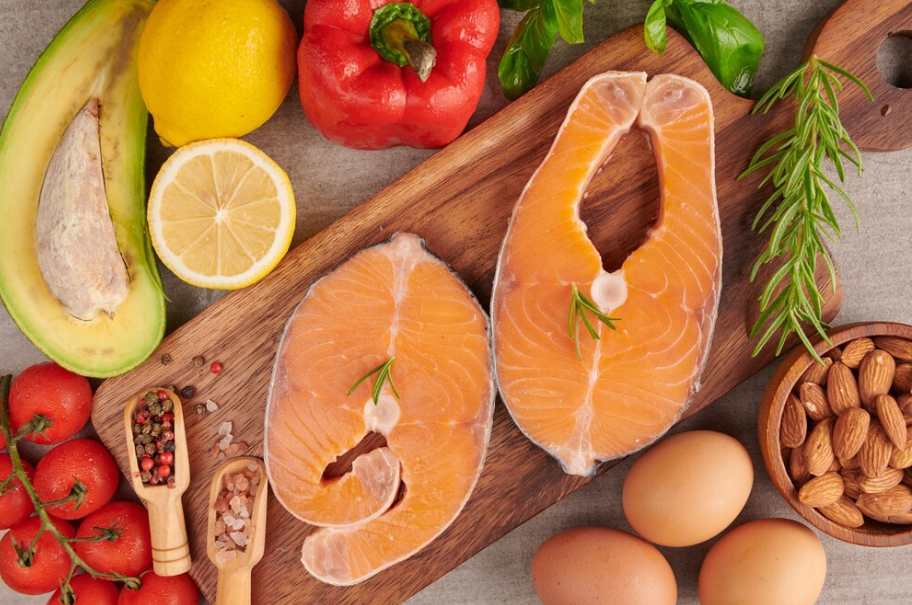Your brain is the control center of your body, and just like any high-performance machine, it needs the right fuel to function at its best. The foods you eat play a crucial role in enhancing cognitive function, improving memory, and protecting your brain from age-related decline.
In this article, we’ll explore the top brain-boosting foods that can help you stay sharp, focused, and mentally agile.
Why Food Matters for Brain Health
The brain consumes about 20% of your body’s energy, making it one of the most energy-demanding organs. To perform at its peak, it requires a steady supply of nutrients, including antioxidants, healthy fats, vitamins, and minerals. These nutrients help:
- Improve memory and learning
- Enhance focus and concentration
- Protect against oxidative stress and inflammation
- Support the growth of new brain cells
By incorporating brain-boosting foods into your diet, you can nourish your mind and support long-term cognitive health.
Top Brain-Boosting Foods
1. Fatty Fish
- Why It’s Great: Fatty fish like salmon, mackerel, and sardines are rich in omega-3 fatty acids, particularly DHA, which is essential for brain health. Omega-3s support brain cell structure, improve memory, and reduce inflammation.
- How to Enjoy: Grill salmon for dinner, add sardines to salads, or enjoy a tuna sandwich for lunch.
2. Blueberries
- Why They’re Great: Packed with antioxidants, blueberries protect the brain from oxidative stress and may improve communication between brain cells. They’re also linked to better memory and delayed brain aging.
- How to Enjoy: Add blueberries to your morning smoothie, oatmeal, or yogurt.
3. Walnuts
- Why They’re Great: Walnuts are a top source of alpha-linolenic acid (ALA), a plant-based omega-3 fatty acid. They also contain antioxidants and vitamin E, which support cognitive function.
- How to Enjoy: Snack on a handful of walnuts or sprinkle them over salads and desserts.
4. Dark Chocolate
- Why It’s Great: Dark chocolate (with at least 70% cocoa) is rich in flavonoids, caffeine, and antioxidants. These compounds boost memory, improve mood, and enhance focus.
- How to Enjoy: Enjoy a square or two of dark chocolate as an afternoon treat.
5. Broccoli
- Why It’s Great: Broccoli is high in antioxidants and vitamin K, which supports brain cell function and cognitive health. It also contains compounds that reduce inflammation.
- How to Enjoy: Steam broccoli as a side dish or add it to stir-fries and soups.
6. Pumpkin Seeds
- Why They’re Great: Pumpkin seeds are loaded with magnesium, iron, zinc, and copper—all of which are essential for brain health. They also contain antioxidants that protect the brain from free radical damage.
- How to Enjoy: Sprinkle pumpkin seeds on salads, yogurt, or oatmeal.
7. Turmeric
- Why It’s Great: The active compound in turmeric, curcumin, has powerful anti-inflammatory and antioxidant properties. It can cross the blood-brain barrier, improving memory and promoting the growth of new brain cells.
- How to Enjoy: Add turmeric to curries, soups, or golden milk lattes.
8. Eggs
- Why They’re Great: Eggs are a rich source of choline, a nutrient that supports brain development and the production of acetylcholine, a neurotransmitter involved in memory and learning.
- How to Enjoy: Enjoy eggs boiled, scrambled, or as an omelet for breakfast.
9. Green Tea
- Why It’s Great: Green tea contains caffeine and L-theanine, which improve focus and alertness. It’s also rich in antioxidants that protect the brain from aging.
- How to Enjoy: Sip on a cup of green tea in the morning or afternoon.
10. Oranges
- Why They’re Great: Oranges are an excellent source of vitamin C, a powerful antioxidant that protects brain cells from damage and supports mental clarity.
- How to Enjoy: Enjoy oranges as a snack or add them to salads and smoothies.
The Science Behind Brain-Boosting Foods
The connection between diet and brain health is backed by extensive research. For example:
- Omega-3 Fatty Acids: Studies show that omega-3s, particularly DHA, are essential for brain development and function. They help build cell membranes in the brain and reduce inflammation, which is linked to cognitive decline.
- Antioxidants: Foods rich in antioxidants, like blueberries and dark chocolate, protect the brain from oxidative stress, which can damage cells and contribute to aging and neurodegenerative diseases.
- Vitamins and Minerals: Nutrients like vitamin E, vitamin K, and magnesium play critical roles in brain health. Vitamin E protects cell membranes, vitamin K supports brain cell function, and magnesium aids in nerve signaling.
Tips for Incorporating Brain-Boosting Foods into Your Diet
- Start Your Day Right: Add berries, nuts, or seeds to your breakfast for a brain-boosting kick.
- Snack Smart: Choose nuts, dark chocolate, or fresh fruit for a healthy, brain-friendly snack.
- Cook with Brain Health in Mind: Use turmeric, olive oil, and leafy greens in your meals.
- Stay Hydrated: Dehydration can impair focus and cognitive function, so drink plenty of water throughout the day.
The Role of a Balanced Diet in Brain Health
While individual foods can provide specific brain-boosting benefits, a balanced diet is key to overall cognitive health. A diet rich in fruits, vegetables, whole grains, lean proteins, and healthy fats ensures that your brain gets all the nutrients it needs to function optimally. Avoid processed foods, excessive sugar, and trans fats, as they can contribute to inflammation and cognitive decline.
Conclusion: Feed Your Brain, Fuel Your Life
Your brain is your most valuable asset, and the foods you eat can significantly impact its performance. By incorporating these brain-boosting foods into your diet, you can enhance memory, improve focus, and protect your brain from age-related decline.
Remember, small changes can lead to big results—so start nourishing your mind today for a sharper, healthier tomorrow.
